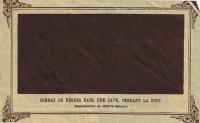Negro
From The Art and Popular Culture Encyclopedia
| Revision as of 23:17, 10 July 2007 WikiSysop (Talk | contribs) ← Previous diff |
Current revision Jahsonic (Talk | contribs) |
||
| Line 1: | Line 1: | ||
| + | {| class="toccolours" style="float: left; margin-left: 1em; margin-right: 2em; font-size: 85%; background:#c6dbf7; color:black; width:30em; max-width: 40%;" cellspacing="5" | ||
| + | | style="text-align: left;" | | ||
| + | "Morning, noon and night we were subjected to jeers, insults and blows because we were "[[Negro|Negroes]]". Who will ever forget that the black was addressed as "tu", not because he was a friend, but because the polite "vous" was reserved for the white man?" --[[Patrice Lumumba]], "[[Congolese Independence Speech]]" from ''[[The Truth about a Monstrous Crime of the Colonialists]]'', Moscow, Foreign Languages Publishing House, 1961, pp. 44-47. [https://www.marxists.org/subject/africa/lumumba/1960/06/independence.htm] | ||
| + | |} | ||
| + | [[Image:Combat de nègres dans un tunnel.jpg|thumb|right|200px|''[[Negroes Fighting in a Tunnel at Night]]'' (1882) by [[Paul Bilhaud]], here shown in the 1887 version [[Appropriation (art)|appropriate]]d by [[Alphonse Allais]] as published in ''[[Album primo-avrilesque]]'' (April fool-ish Album)]] | ||
| {{Template}} | {{Template}} | ||
| - | '''Negro''' is a [[racial]] term applied to [[black people]]. However, prior to the shift in the "lexicon" of American and worldwide classification of race and ethnicity in the late [[1960]]s, the appellation was accepted as a normal formal term both by those of African descent as well as non-blacks. '''''Negro''''' means black in [[Spanish language|Spanish]] and [[Portuguese language|Portuguese]], and the [[Italian language|Italian]] '''''nero''''' is similar ([[Latin]]: ''niger'' = "black"). | + | '''Negro''' is a [[racial]] term applied to [[black people]]. However, prior to the shift in the "lexicon" of American and worldwide classification of [[race]] and [[ethnicity]] in the late [[1960]]s, the appellation was accepted as a normal formal term both by those of African descent as well as non-blacks. '''''Negro''''' means black in [[Spanish language|Spanish]] and [[Portuguese language|Portuguese]], and the [[Italian language|Italian]] '''''nero''''' is similar ([[Latin]]: ''niger'' = "black"). |
| Near-synonyms in common use include | Near-synonyms in common use include | ||
| *"black" | *"black" | ||
| - | *"dark-skinned" | + | *"dark-[[skinned]]" |
| *"coloured" (though in [[South Africa]] this means "of mixed race") | *"coloured" (though in [[South Africa]] this means "of mixed race") | ||
| *"African" (or, in the [[United States]], "African-American"). | *"African" (or, in the [[United States]], "African-American"). | ||
| However, these terms are not clearly racial — the first three can refer to other non-white groups, while the last one, being a geographic reference, could be interpreted to refer to [[North Africa]]ns as well. | However, these terms are not clearly racial — the first three can refer to other non-white groups, while the last one, being a geographic reference, could be interpreted to refer to [[North Africa]]ns as well. | ||
| + | |||
| + | == See also == | ||
| + | *[[Negermusik]] | ||
| + | *''[[How I Became a Negro]]'' | ||
| + | *''[[The White Negro]]'' | ||
| + | *''[[Etude de nègre]]'' ([[1838]]) by [[Théodore Chassériau]] | ||
| + | *"[[De nigger woman is de mule uh de world so far as Ah can see]]" (1937) by Zora Neale Hurston | ||
| {{GFDL}} | {{GFDL}} | ||
Current revision
|
"Morning, noon and night we were subjected to jeers, insults and blows because we were "Negroes". Who will ever forget that the black was addressed as "tu", not because he was a friend, but because the polite "vous" was reserved for the white man?" --Patrice Lumumba, "Congolese Independence Speech" from The Truth about a Monstrous Crime of the Colonialists, Moscow, Foreign Languages Publishing House, 1961, pp. 44-47. [1] |

|
Related e |
|
Featured: |
Negro is a racial term applied to black people. However, prior to the shift in the "lexicon" of American and worldwide classification of race and ethnicity in the late 1960s, the appellation was accepted as a normal formal term both by those of African descent as well as non-blacks. Negro means black in Spanish and Portuguese, and the Italian nero is similar (Latin: niger = "black").
Near-synonyms in common use include
- "black"
- "dark-skinned"
- "coloured" (though in South Africa this means "of mixed race")
- "African" (or, in the United States, "African-American").
However, these terms are not clearly racial — the first three can refer to other non-white groups, while the last one, being a geographic reference, could be interpreted to refer to North Africans as well.
See also
- Negermusik
- How I Became a Negro
- The White Negro
- Etude de nègre (1838) by Théodore Chassériau
- "De nigger woman is de mule uh de world so far as Ah can see" (1937) by Zora Neale Hurston

